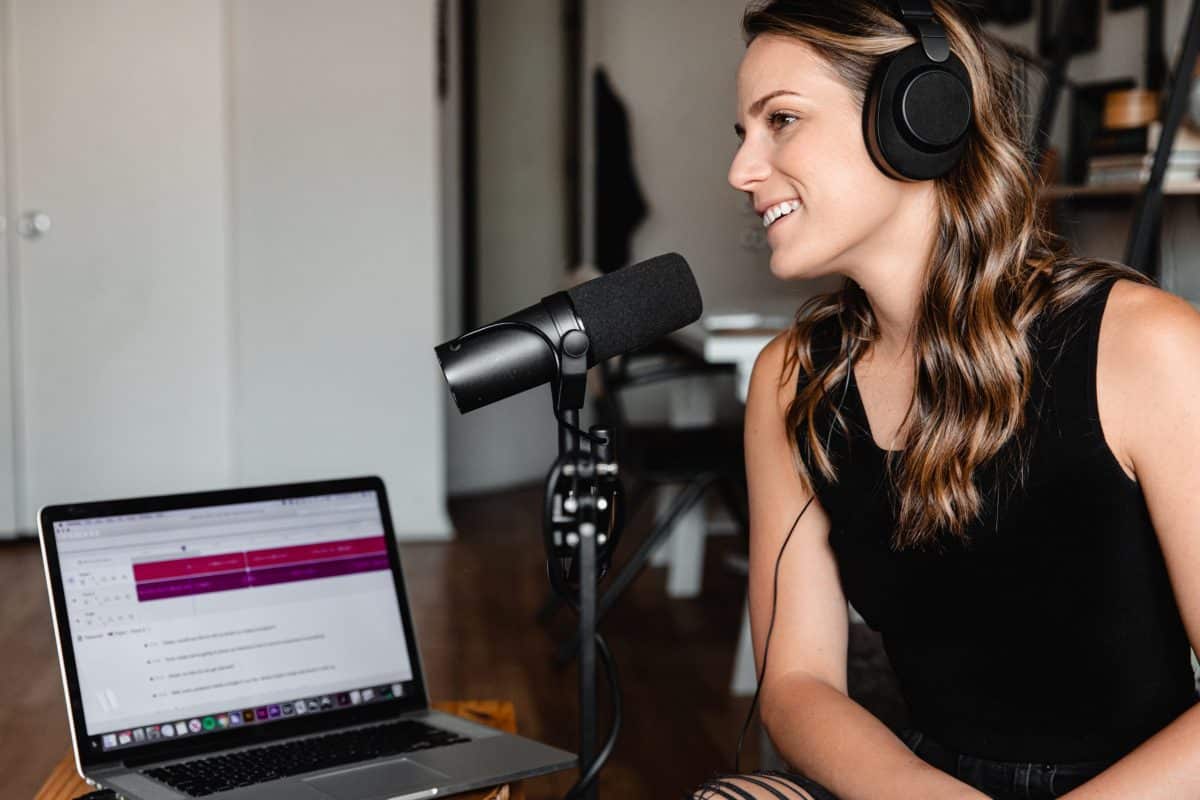Ready to make money podcasting? Great, you came to the right place!
In this guide, we’re doing a deep dive into the top seven ways podcasters like you make money including:
- Sponsorships and Advertising
- Affiliate Marketing
- Create Your Own Products To Sell
- Sell Your Services
- Ask for Donations
- Enable Bitcoin Boostagrams
- Host Events
Then, we’ll share a rapid fire list of even more ways to make money podcasting you might not know exist!
However, before implementing any monetization strategy for your podcast, ensure you have:
– A clear understanding of who your show is for (and who it’s not for)
– An engaged email list
– A strong call-to-action strategy for each episode
– Quality production values that make your show ‘recommendable’”
Now that you know what people are doing, let’s dive into each monetization strategy so that you can determine which option(s) are right for you and your show.
1. Sponsorships and Advertising
In a sponsorship, you endorse a company’s product or service on your podcast in exchange for payment.
There are four commonly accepted types of sponsorships:
Clip(s) of you speaking about the company
According to John Lee Dumas of the popular Entrepreneurs on Fire podcast, The current industry standard for traditional sponsorships is for you to record a 15-second pre-roll (where you talk about the company that is sponsoring you before launching into your podcast) and a 60-second midroll (where you talk about the company midway through the podcast).
He also states in his guide to podcast sponsorships that you can expect to command $18 per 1000 CPMs (listens) for a 15-second pre-roll. A 60-second mid-roll can net you $25 per 1000 CPMs.
Megan Shields of ChimeHouse Media notes, “When seeking sponsors, remember that targeting is crucial. If you have a podcast about organic living, you can target people interested in organic living… Therefore, you are marrying your content with the people that want to see it, and it’s a beautiful combination.”

Brief mentions in the intro/outro
With this sponsorship method, companies will pay you to simply say that your episode, season, or entire show is sponsored by them in the intro and/or outro of your show. We’ve heard these mentions as short as, “This episode is sponsored by [insert sponsor here],” with no further mention of the sponsor the rest of the episode.
Some hosts choose to sprinkle in additional mentions throughout their entire show, and others keep all sponsorship shout outs at the end of their shows. If there is a super short mention, sponsors may expect a shoutout on social media, a backlink on your website, or even a link to them in your podcast newsletter.
Clip(s) of the sponsor speaking
Some podcast sponsors will submit pre-recorded ads to a host that they can drop into their show wherever they choose to do so. This is the most similar to the radio ads played on AM and FM stations. The sponsor pays a fee, and you simply splice it into however many episodes they pay for.
Paid interview segments
In this type of sponsorship, a company or person will pay you to interview them on your show. The host can release this interview as a bonus episode, or include it at the beginning or end of another episode. Sometimes the content that comes out of the interview is good enough to warrant being the sole focus of an entire episode in your regular content calendar.
The amount of money you charge can vary widely as well. When you’re just starting your podcast, you might not make very much, but as your listenership grows, so will your sponsorship rates.
💡Pro Tip: Always make sure the endorsement makes sense for your listeners.
For example, you wouldn’t want to endorse a meat delivery service to an audience that is mostly vegetarian. Choose companies that line up with your values and those of your audience, and the experience will be more authentic for everyone.
Strategic Content Monetization
When incorporating ads or monetized content, be thoughtful about placement. As Matthew Passy of Custom Podcast Solutions advises, “Listen back to your show carefully and ask yourself, ‘Is the order that things tumbled out in the best order for this information to be presented?’ This applies to ad placement as well as content structure.”
Is Advertising/Sponsorships a Good Way to Monetize Your Podcast?
Maybe, maybe not. Like podcasting guru Pat Flynn says, “Advertising is not always a great strategy because for one, maybe [your listeners] have heard those ads enough and they’re gonna scroll through, hitting that 15 second button, just to get through that part. Or perhaps those products [you’re advertising] don’t even align with your audience, in which case they might not even listen to your show anymore.”
The key when you are trying to determine how to monetize your podcast is to deliver value. That is why alignment is so important when choosing people to advertise on your show. It’s better to try and choose sponsorships that make sense for your audience, rather than focusing on who will pay you for access to them.
Top Tips for Getting Sponsored
We cover some of these tips in our post “5 Tips for Pitching Your First Sponsor,” but here’s the gist of what you need to know:
- Think about what you can deliver to the sponsor before you pitch them
- Do your research to make sure it will be mutually beneficial for them, you, and your audience
- Track everything – from user engagement to number of downloads. This includes your podcast analytics. You’ll need these numbers to share with potential sponsors.
- Start small, and deliver everything you promise
- Wait until you have at least 1,000 downloads of your show
- Get it in writing – whatever you agree to, put it in a contract
Take the Guesswork Out of Advertising with RSS.com Programmatic Ads
Monetizing your podcast just became incredibly simple with RSS.com’s PAID feature.
PAID = Programmatic Ads Inserted Dynamically
Available to podcasters with our “All in One Podcasting” and “Podcast Networks” plans, this programmatic advertising solution takes the complexity out of earning revenue by automatically selecting and inserting ads into your episodes.
No more spending countless hours reaching out to potential advertisers or managing complex ad campaigns. PAID works on an auction-based system that maximizes your earning potential while maintaining full control over ad categories through our filtering options.
With worldwide ad inventory access and a qualification threshold of just 10 monthly downloads, PAID opens the door to monetization for podcasters at every stage of their journey.
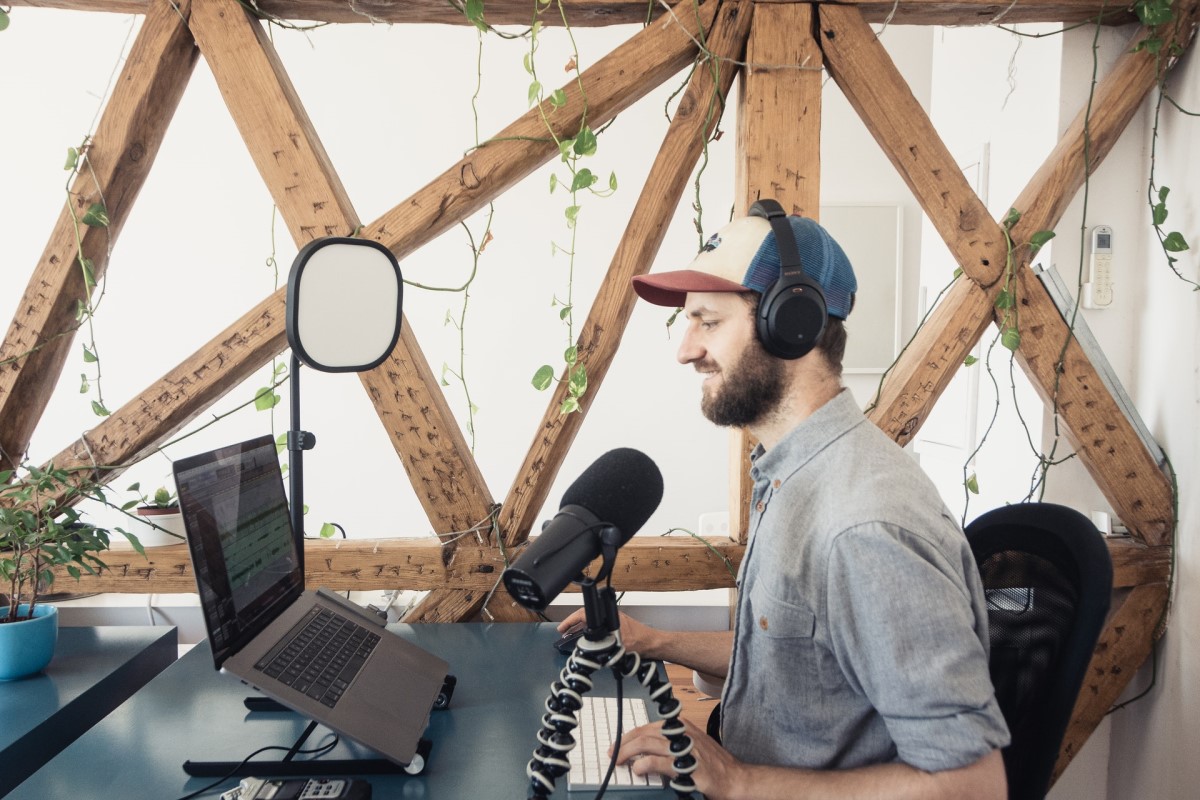
2. Affiliate Marketing
As with sponsorships, it’s best to only work with companies that are in line with your audience’s values and what they would actually need/want.
Ideally, you should be a consumer of the product or service yourself. In other words, it’s never a good idea to recommend something you haven’t personally tried!
There are two generally accepted types of affiliate marketing – low ticket and high ticket
Low Ticket items are typically lower priced items that you will make a low commission on.
One of the most popular affiliate marketing programs for podcasters just starting out is the Amazon Associates program.
Podcasters like to use Amazon because there is a low barrier to entry. In other words, you don’t need a lot of listeners to sign up. However, the catch is the commissions are generally very low – think 1%-3% if you’re lucky. While these commission rates can go as high as 10-15% those rates are usually reserved for larger influencers who drive a lot of sales.
Other options for low ticket affiliate marketing include websites like:
High Ticket items are higher priced products/services you’ll topically make more money on.
Think digital courses that are $1,000, $2,000, $5,000, and up. These types of affiliate partnerships generally are reserved for hosts with larger audiences, and often have a lengthier application process. They also often require you have purchased the item or course you are applying to market.
- Products you use in your own business (i.e. a hairstylist may be an affiliate for hair care products and accessories or a nutritionist may be an affiliate for supplements)
- Tools and software (i.e. email service providers such as ConvertKit, shopping cart applications such as Salesforce, plug-in recommendations such as WooCommerce)
- Equipment you use to produce your podcast like microphones, headphones, editing software, etc.

3. Create Your Own Products to Sell
This is one of the best ways to monetize your podcast because you keep control over the whole process. When you work with sponsorships or affiliate partners, you’re sending your audience away from you to make a purchase. But if you have a product, and you have engaged podcast listeners, you keep the audience on your own platforms and you get to keep all the profits as a result.
What if you don’t have a product, but want to create one? Your audience could be the key to a product that isn’t on the market yet. Engage with them and learn what they need, then develop and sell it!
Your show could be the perfect way to advertise your new product even before it’s ready to sell. You can promote your products in a pre-roll, mid-roll, or post-roll ad. Or, you can focus your topics on subjects that naturally lend well to placing your product as the solution.
Coach Tracy Beavers says the key to selling your own products on your podcast is having a clear call-to-action strategy with every promotion you do. She says, “CTAs are simple and easy to use, but they are also simple and easy to forget… Every time you’re creating your content for your podcast, use the strategy… and you’ll be all set [to grow] your income.”
💡 Pro Tip: Use your podcast to build your audience, demonstrate your value, and position your products as the solution to your audience’s problems.
There are two types of products you can create to sell: digital and physical
Digital products can include everything from eBooks to courses, extended interview audio files to email swipe files.
Podcasters can use their shows as the research lab for digital products they create or they can use their audiences to sell products that already exist in their business including:
- Legal templates for starting a business or launching a blog
- Swipe files of email marketing copy to market a business
- Guided meditations
- Entire courses teaching everything from how to start a garden to how to lose weight in 30 days
- eBooks filled with interview transcripts and key takeaways from popular guests
- Recipe videos and meal plans
- Your podcast host may offer an affiliate program, so you can make money recommending a service you already use.
Physical products can include the podcast merch you create, or products you bundle together to sell as one package.
Physical podcast merch can include:
- Journals, planners, and physical copies of books
- Shirts, hats, hoodies, and other wearables
- Custom mugs, stickers, buttons, and miscellaneous novelty items
- Homemade crafts
- Pretty much anything that can be sold on an ecommerce website
One of the more popular physical products used by podcasters are subscription boxes. There are a lot of subscription box companies that offer things like women’s toiletries, whiskey cocktails, retro candy, etc., so it should be no problem to find a product that aligns with your audience.
💡 Pro Tip: Do you have a subscription box idea, but not sure where to start? Check out Subscription Box Basics with Julie on Apple Podcasts.

4. Sell Your Own Service
Maybe the idea of creating products seems too difficult, or like it would require too many moving parts to keep track of. Instead you could offer a service such as coaching, consulting, or something similar. Your podcast audience already likes what you have to say. Figure out how to package your message into a service, and use your podcast as a platform to advertise it.
Perhaps you’re a photographer – you could use your show to book more photography gigs. Or let’s say you’re a freelance graphic designer – your show might be just what you have been looking for to book out your calendar with more clients than you know what to do with.
Some of the most popular services that you can advertise on your own podcast are consulting, coaching, training, and speaking.
Consulting
If you’re an expert in your field, you could sell consulting services to teach people how to be successful in your industry. And, if you already have a proven track record of making money in the industry, it will be that much easier to find clients to consult.
💡Pro Tip: Check out this awesome guide to selling your consulting services from Close.com

Coaching
From life coaching to nutrition, systems and processes to creative writing coaching, there’s likely an audience who needs your expertise. The three methods of coaching are:
One on one
You work with a single person to coach them in your field of expertise. This is often referred to as trading dollars for hours because it’s hard to scale up as your income is limited to the number of people you can serve in a single day.
One to a few
You work with a small group. A lot of people opt for this method because they can serve more clients, and therefore, make more money per hour.
One to many
You work with a large group. This is the most scalable way to coach. Some coaches charge a premium for one to one, or one to few, and offer large group coaching as a means to make their service more affordable to their audience.
The audience won’t get as much access to you, however, and you might need to bring on support staff to help you serve everyone of your clients.
Training/Workshops
Similar to selling courses, training can mean hosting paid classes online or in person. Like coaching, it can be done one on one, one to a few, or one to many.
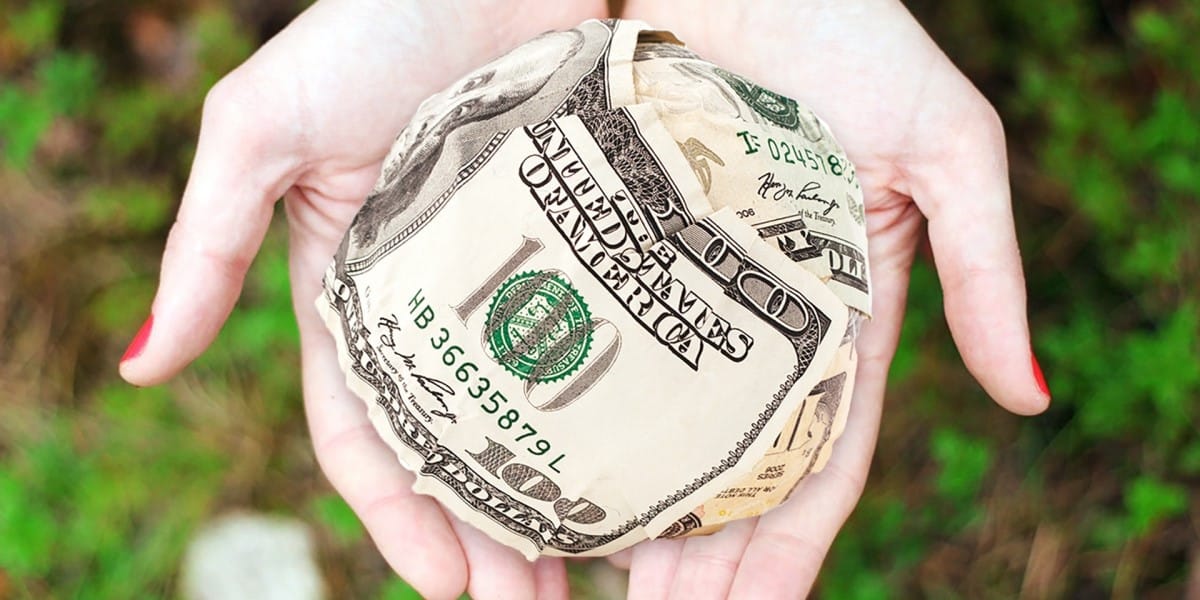
5. Ask for Donations
Asking for donations from your followers can be an effective way to start earning money from your show.
Some of the more popular donation platforms include:
- Patreon for Podcasters allows your followers to send you monthly donations in exchange for special content and incentives.
- Make a PayPal Donate button for one-time or monthly donations
- Use Buy Me A Coffee to accept tips, donations, and memberships
- Use Venmo and Cash App to request donations on social media
Once you are set up on one of the following platforms, it’s time to add a donation button to your public podcasting website provided by your podcast host.
If you host with RSS.com, here’s how to add a donation button:
Step 1. Log into your account, and click settings at the top of the page in your dashboard.

Step 2. Click +Activate in the “Donations and Funding” section and add the link to your fundraising or membership page.
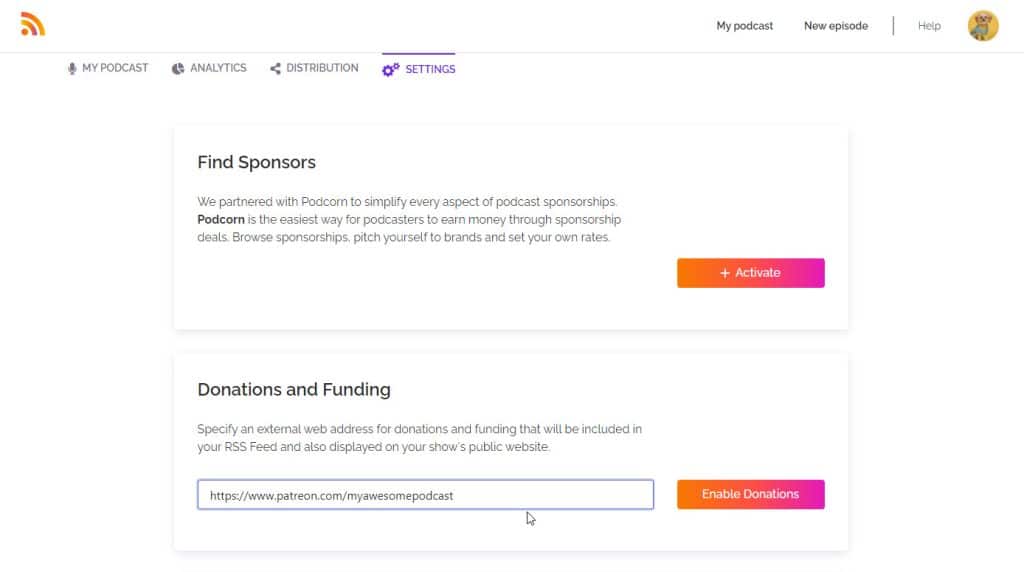
Step 3. Select “Enable Donations.” A donation button will now appear on your public podcast profile on RSS.com.
Now that your donation button is active, we recommend adding a call-to-action in your show notes and/or in your podcast episodes to direct your listeners to.
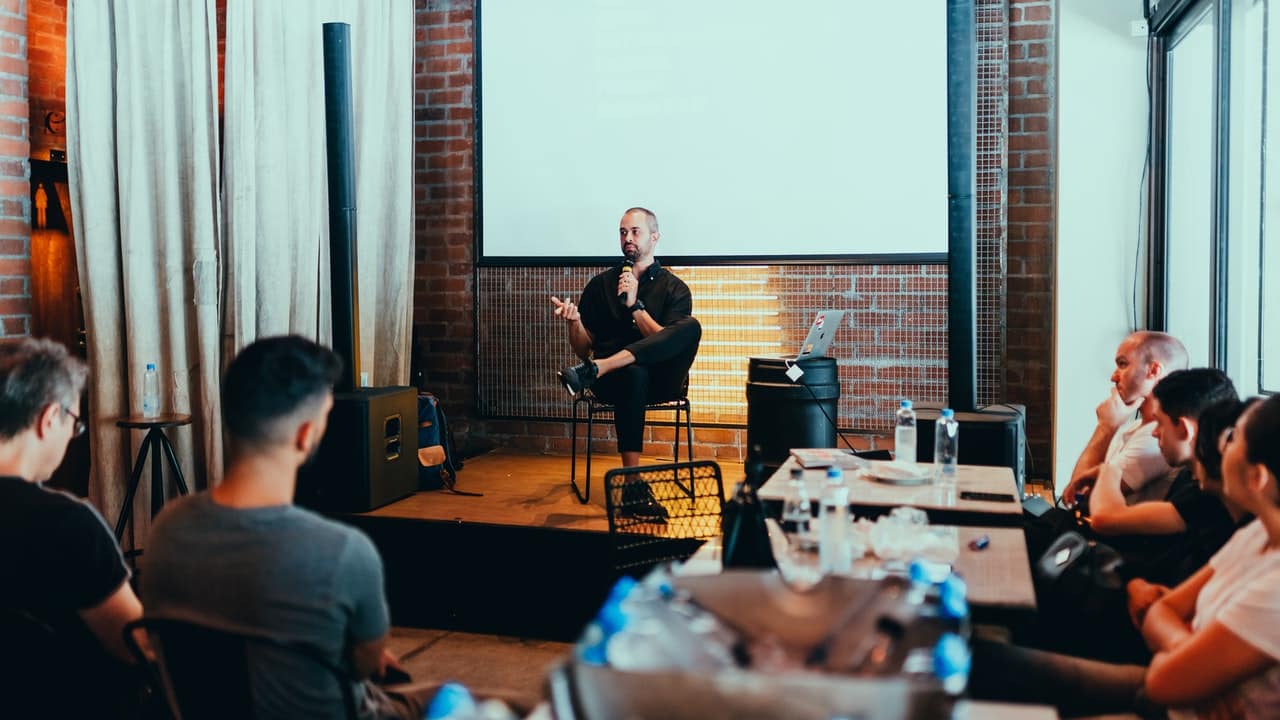
6. Hosting Live Events
Hosting conferences, conventions, retreats, and mastermind groups could be your ticket to making big money with your podcast.
Because of the time and resources required, many people choose to host their live events virtually. There’s nothing quite like seeing your fans in person, however.
If you’re already hosting live events like this, using your podcast could be a way to drum up interest with your audience that increases attendance
Check out these resources if you’re looking for more info on how to host live events for your podcast audience:
- How to Host a Successful Virtual Event: Tips and Best Practices
- Host a Paid Online Event Using Facebook Live
- From Start to Finish: How to Plan a Retreat People Will Love
- How to Organize a Conference: Step-By-Step Guide

7. Earn Cryptocurrency
Did you know that you can make Bitcoin podcasting?
RSS.com has partnered with Alby to enable Value 4 Value Payments, making it easy for podcasters to receive Boostagrams.
These Value 4 Value payments allow your listeners to support your show by paying you directly with Bitcoin/cryptocurrency.
Even More Ways to Make Money Podcasting
There are so many ways you can make money podcasting. Here are several more additional ways you can turn your podcast into a revenue stream:
8. Premium Content Model
You can offer exclusive content to paying subscribers through platforms like Patreon or Apple Podcasts Subscriptions.
Perhaps you want to offer ad-free episodes or extended interviews. Maybe you plan to create bonus episodes that your regular listeners don’t get access to.
Many successful podcasters use a tiered approach, offering different levels of premium content at different price points.
Please note, our Apple Podcasts Subscriptions integration is currently only available to podcasters with an “All in One Podcasting” or Podcast Networks” plan.
Also see: How Podcast Hosts Can Interact with Their Listeners
9. Paid Membership Community
You could create a community around your podcast where members pay for access to you and each other. This could be a private Discord server, Facebook group, or even a platform like Slack where your biggest fans can connect, ask questions, and get direct access to you.
Discord has actually become a powerful monetization platform for podcasters. Beyond basic membership communities on the platform, you can:
- Use Discord’s native Server Subscriptions (available in select countries)
- Create tiered access levels with exclusive voice channels
- Deliver podcast content directly through Discord channels
- Host paid masterminds and workshops in private channels
- Charge for exclusive Discord-only bonus episodes
The key is providing real value. Think exclusive content, direct access to you, and a tight-knit community that justifies the subscription cost.
Why would your listeners pay to join a community, you ask? The value comes from the relationships and networking opportunities that can’t be found in your free content.
10. Podcast Network Model
Once you’ve established one successful show, you could launch additional podcasts under the same brand to create a network. The great thing about podcast networks is that you can cross-promote between shows and attract bigger advertisers interested in your expanded audience. Networks can share resources, production costs, and marketing efforts, making them more efficient than standalone shows.
You can learn more about podcast networks in our guide “How to Start a Podcast Network.” Or watch our video How to Manage Multiple Podcasts: Setting Up a Podcast Network with RSS.com:
11. Speaking Engagements
A fun way to monetize your podcast is through speaking engagement. Your podcast already showcases your expertise, Why not use it to land paid speaking gigs at conferences, corporate events, and workshops? When you think about it, your podcast is a lot like a public portfolio. I”t proves to the public you have communication skills. Many podcasters find that speaking fees can quickly surpass their direct podcast revenue. Check out Speaker Lab’s guide to finding paid speaking opportunities if you want to test out this idea to make money podcasting.
12. Courses
Package your knowledge into online courses or workshops that solve specific problems for your audience. Your podcast serves as the perfect marketing channel for these educational products. You’ve already built trust with your audience through free content, making them more likely to invest in your premium educational offerings.
13. Pay-to-Play Guest Model
While controversial, some established podcasts with large audiences charge guests for an appearance. If you choose this route, be transparent with your audience and only feature guests who add genuine value. This works best for business-focused podcasts where guests can quantify the ROI of reaching your audience.
Debating about this? We recommend reading “The Pros & Cons Of Making Guests Pay To Be On Your Podcast” to help you make your decision.
14. Collaborations and Joint Ventures
Partner with complementary businesses or creators to develop co-branded content, products, or services that you can promote to both audiences. These collaborations often extend beyond the podcast itself and can lead to profitable business relationships. Joint webinars, co-authored eBooks, or shared events can all generate revenue.
15. Website Ad Space
If your podcast website gets significant traffic, sell display ad space directly to advertisers interested in reaching your audience. This creates an additional revenue stream beyond your audio content.
You could use a web ad space referral partner such as Mediavine who will place ads on your website, or you could use a platform like Google Ad Manager to handle the technical aspects of displaying and tracking ads.
16. Newsletter Advertising
Build an email list of your podcast listeners and sell advertising space in your newsletter. Email has consistently higher engagement rates than social media, making it valuable real estate for advertisers. You can either find sponsors yourself or join newsletter advertising networks that will connect you with relevant advertisers.
Related: How to monetize a newsletter
17. Social Media Monetization
Turn clips from your podcast into short-form content for platforms like Instagram Reels, TikTok, and YouTube Shorts, then monetize through platform-specific programs. These “micro-content” pieces can drive new listeners to your show while also generating their own revenue through platform monetization programs like the TikTok Creator Fund, or Meta for Creators
18. Corporate Partnerships
Develop long-term relationships with brands that go beyond traditional sponsorships, such as creating custom content series or serving as a brand ambassador. These partnerships typically last longer than standard sponsorships and can include content creation across multiple platforms, not just your podcast. The consistent income provides more stability than one-off sponsorships.
19. Podcast Advertising Networks
Join podcast advertising networks like Audiogo that connect podcasters with advertisers and handle much of the sales process for you. These networks take a percentage of ad revenue but save you the time and effort of finding and negotiating with sponsors directly.
Note: Most networks have minimum download requirements before you can join.
20. Lead Generation for Your Business
Use your podcast to attract potential clients or customers to your existing business. The podcast itself might not generate direct revenue, but it creates a pipeline of qualified leads. This works especially well for service-based businesses like coaching, consulting, or agency work, where a single new client can be worth thousands of dollars.
If you like the idea of monetizing your podcast by using it as a marketing tool for your business, you have to check out our video Grow Your Business with Podcasting: Strategies Beyond Downloads
21. Podcast Licensing
Did you know you can license your content to other platforms, radio stations, or media outlets for additional distribution and revenue? Your podcast episodes have value beyond their initial release, and some organizations might pay to rebroadcast them or translate them for international audiences. Educational institutions might also license your content for teaching purposes.
Learn more about content licensing here.
22. Book Deals
Use your podcast’s success and audience to secure a book deal, either through traditional publishing or self-publishing. Your podcast serves as both research and a marketing platform for your book. Many publishers now look specifically for authors who have built an audience through podcasting or other platforms.
Read PublishDrive’s post “How to Turn a Podcast into a Book and a Book into a Podcast” for more ideas on creating a book from your show.
23. Subscription Boxes
Create physical subscription boxes related to your podcast’s topic that listeners can purchase monthly or quarterly. This works especially well for hobby-focused podcasts. Each box could include curated products, exclusive merchandise, and special content related to your podcast theme. The recurring revenue model makes this an attractive option.
Cratejoy created an awesome guide on this very subject. Check out “How to Start a Subscription Box Business in 8 Simple Steps.”
24. Create Podcast Merch
From t-shirts to coffee mugs, selling branded merchandise can be both a revenue stream and a walking advertisement for your show. Print-on-demand services like Printful or TeeSpring make it easy to start without inventory costs. The best podcast merchandise reflects inside jokes or catchphrases that loyal listeners will immediately recognize.
Click here to learn our do’s and don’ts about creating products.
25. Livestream Your Podcast Episodes
Take your podcast live and monetize in real-time. Platforms like YouTube and Twitch allow you to stream podcast recordings live while earning through:
- Paid virtual tickets
- Super Chats and viewer donations during the stream
- Exclusive backstage access for premium supporters
- Live Q&A sessions with paying members
Some successful podcasters now record episodes live, then release the edited version later, creating two revenue opportunities from one recording session.
26. Start a YouTube Channel
YouTube has become a major player in podcast monetization. In fact, many podcasters earn more from YouTube than from audio-only platforms.
Consider recording video alongside audio from the start to gain access to:
- YouTube Partner Program ad revenue (share of ads played before your episodes)
- Super Thanks (one-time viewer payments)
- Channel Memberships (recurring subscriber perks)
- YouTube Shorts monetization (perfect for repurposed podcast clips)
- Premium video revenue from YouTube Premium subscribers
Learn more: How to Create a YouTube Channel for Your Podcast
How Will You Monetize Your Podcast?
There is no right way or wrong way to go about making money podcasting. As long as you keep your audience top of mind, you can use one, some, or all of these methods.
Which will you choose? You don’t have to decide right now. But, hopefully this post has inspired you to start looking at your options and making plans.
After all, podcasting is a lot of work. You deserve to be paid for your efforts!

